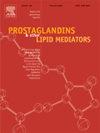Lutein, a non-provitamin A carotenoid, reduces cisplatin-induced cardiotoxicity
IF 2.5
3区 生物学
Q3 BIOCHEMISTRY & MOLECULAR BIOLOGY
Prostaglandins & other lipid mediators
Pub Date : 2025-01-22
DOI:10.1016/j.prostaglandins.2025.106965
引用次数: 0
Abstract
Cardiovascular complications resulting from cisplatin (CS) are a significant factor that can disrupt the treatment plan associated with this chemotherapy. This information led us to investigate the effectiveness of lutein (LT), which has antioxidant effects, in preventing CS-induced cardiotoxic effects. After 28 rats were randomly divided into four equal groups, saline (1 ml/day) was administered to the control group, LT (100 mg/kg/day) to the LT group, CS (10 mg/kg) to the CS group, and active agents in the LT and CS groups were administered to the CS + LT group in the same dose and manner. The examinations determined that MDA, cardiac biomarkers (CK-MB, BNP, LDH, and cTn-I) levels, TNF-α and caspase-3 expressions, and apoptosis significantly increased in the CS group. In contrast, GSH, SOD, and CAT levels were decreased. In addition, histopathological changes characterized by interstitial edema, leukocyte infiltration, and vacuolar degeneration were detected in the heart tissues of this group. It was determined that LT application prevented the above-mentioned CS-induced cardiotoxic effects to a significant extent, although not completely. The findings obtained in this study show that LT may reduce CS-induced cardiac damage thanks to its ROS-reducing, anti-inflammatory, anti-apoptotic, and cytoprotective characteristics.
叶黄素,一种非维生素a原类胡萝卜素,减少顺铂引起的心脏毒性。
顺铂(CS)引起的心血管并发症是一个重要因素,可以破坏与这种化疗相关的治疗计划。这些信息促使我们研究具有抗氧化作用的叶黄素(LT)在预防cs诱导的心脏毒性作用中的有效性。将28只大鼠随机分为4组,对照组给予生理盐水(1ml/d), LT组给予LT (100mg/kg/d), CS组给予CS (10mg/kg), LT组和CS组的活性药物给予CS + LT组相同的剂量和方式。检测发现,CS组MDA、心脏生物标志物(CK-MB、BNP、LDH、cTn-I)水平、TNF-α、caspase-3表达及细胞凋亡均显著升高。相比之下,GSH、SOD和CAT水平降低。此外,心脏组织病理变化表现为间质水肿、白细胞浸润、空泡变性。结果表明,尽管不完全阻止了上述cs诱导的心脏毒性作用,但LT的应用在很大程度上阻止了上述作用。本研究结果表明,LT具有降低ros、抗炎、抗凋亡和细胞保护等特性,可减轻cs诱导的心脏损伤。
本文章由计算机程序翻译,如有差异,请以英文原文为准。
求助全文
约1分钟内获得全文
求助全文
来源期刊

Prostaglandins & other lipid mediators
生物-生化与分子生物学
CiteScore
5.80
自引率
3.40%
发文量
49
审稿时长
2 months
期刊介绍:
Prostaglandins & Other Lipid Mediators is the original and foremost journal dealing with prostaglandins and related lipid mediator substances. It includes basic and clinical studies related to the pharmacology, physiology, pathology and biochemistry of lipid mediators.
Prostaglandins & Other Lipid Mediators invites reports of original research, mini-reviews, reviews, and methods articles in the basic and clinical aspects of all areas of lipid mediator research: cell biology, developmental biology, genetics, molecular biology, chemistry, biochemistry, physiology, pharmacology, endocrinology, biology, the medical sciences, and epidemiology.
Prostaglandins & Other Lipid Mediators also accepts proposals for special issue topics. The Editors will make every effort to advise authors of the decision on the submitted manuscript within 3-4 weeks of receipt.
 求助内容:
求助内容: 应助结果提醒方式:
应助结果提醒方式:


